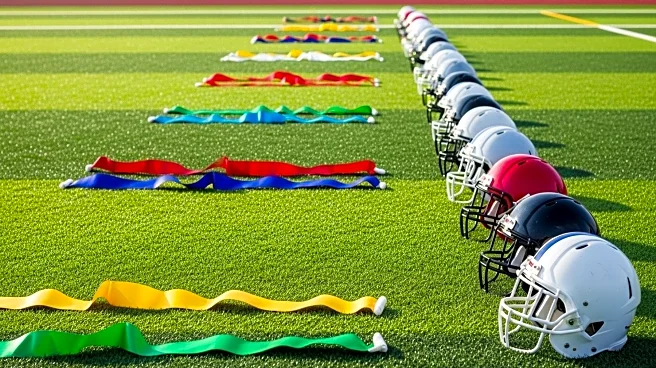What's Happening?
Gabi Bankhardt, a prominent figure in Brazilian football, is making significant strides in promoting flag football among Latin American women. As an NFL Global Flag Football ambassador, Bankhardt is leveraging her position to inspire young girls across Brazil and beyond. Her journey began after forming a team with friends post-university, and she has since become the captain of the Brazilian National team. Bankhardt's efforts coincide with the NFL's expansion into Brazil, including regular-season games and a deal to play at the Maracanã Stadium in Rio. Flag football is also set to debut at the 2028 Los Angeles Olympics, further highlighting the sport's growing prominence.
Why It's Important?
Bankhardt's work is crucial in empowering women in sports, particularly in a region where opportunities for female athletes have been limited. By serving as a role model, she is helping to break down barriers and encourage participation in flag football, a sport known for its inclusivity. The NFL's investment in Brazil and the upcoming Olympic debut of flag football are likely to increase visibility and support for the sport, potentially leading to more resources and opportunities for women. This development could have a lasting impact on gender equality in sports, inspiring a new generation of female athletes.
What's Next?
With the NFL's continued expansion in Brazil and the upcoming Olympic debut, flag football is poised for significant growth. Bankhardt's role as an ambassador will likely involve further outreach and development programs to sustain and increase female participation. The success of these initiatives could influence other sports organizations to invest in similar programs, promoting inclusivity and diversity in sports globally. Additionally, the NFL's goal of hosting more international games could further integrate American football into the global sports landscape.
Beyond the Headlines
Bankhardt's efforts highlight the cultural and societal impact of sports beyond mere competition. By fostering a sense of community and empowerment, flag football serves as a tool for social change, particularly in regions with limited access to sports. The sport's growth in Brazil also reflects broader trends of globalization in sports, where local cultures and international influences intersect. This dynamic could lead to a more diverse and inclusive sports environment, challenging traditional norms and expanding opportunities for underrepresented groups.









